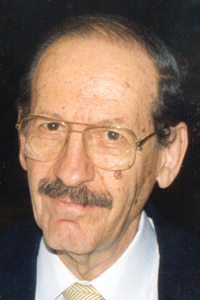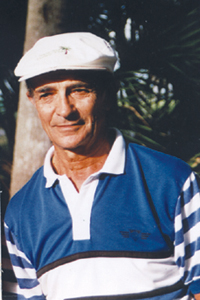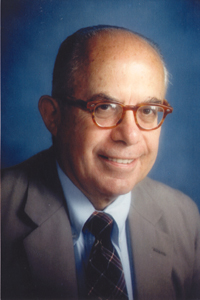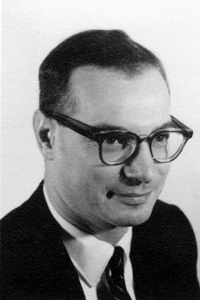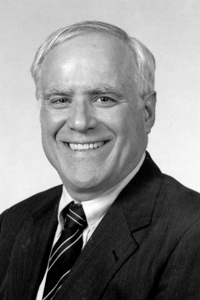|
|
|
OBITUARIES
 |
|
1930
|
 |
Mark Freeman, artist, New York City, on February
6, 2003. Freeman earned a degree from the Architecture School in
1932. His prints and paintings from the 1930s chronicle a seminal
period of New York’s architectural growth in a style that
has been described as “a beautiful blend of the poetic and
historical” and are represented in the Museum of Modern Art,
the Metropolitan Museum of Art, the Brooklyn Museum, the Whitney
Museum, the British Museum, the Corcoran Gallery and the Library
of Congress, among others. He supported the cause of art and artists,
serving as executive officer to numerous art organizations. Freeman
was a lifetime honorary member of the Lotos Club and had one-man
shows at the Hirschl & Adler Gallery and the Sylvan Cole Gallery
in New York. In 1992, Freeman published a book of his work from
the 1930s, Reaching for the Sky. Survivors include his
sons, David ’61 and Stephen ’70 AR; and seven grandchildren,
including Rod ’97E. Freeman’s wife of 67 years, Polly
Allen, predeceased him.
 |
|
1933
|
 |
Orpheus A. “Al” Rogati, retired physician,
Whiting, N.J., on April 15, 2003. Rogati was born in New York City.
He served as a captain in the U.S. Army Medical Corps during World
War II. Rogati was an assistant Manhattan medical examiner, and
his medical practice was in the Bronx until his retirement in 1973,
when he moved to Crestwood Village in Whiting. He was a member of
the American Medical Association, the Bronx County Medical Society
and the Bronx District Branch of the American Psychiatric Association.
In Crestwood Village, he was a member of the Residents Club, the
Italian American Club and the Billiard Club. Rogati is survived
by his wife, the former Kathryn Lewis; daughter, Aurora Ferrero;
son, John A.; and two grandsons.
 |
|
1937
|
 |
Eugene J. Kalil, engineer, New York City, on August
5, 2003. Born in Lawrence, Mass., in 1911, Kalil graduated from
Chapman Technical School in 1930, where he was a champion pole vaulter.
At the College, where he earned a degree in metallurgical engineering,
Kalil won the Metropolitan intercollegiate title in pole vaulting
and participated in the Penn Relays. After graduation, he worked
at International Nickel, where he developed a procedure for making
nickel sheet of the right porosity to separate uranium 235 from
uranium 238, a process involved in making the atomic bomb. The War
Department recognized his work on the Manhattan Project by awarding
him a Certificate of Appreciation on August 6, 1945, for effective
service contributing to the successful conclusion of World War II.
Kalil later graduated from the N.Y. School of Law and became a patent
attorney, becoming a senior partner at the law firm of Hopgood,
Calimafde, Kalil and Judlowe in New York. He also was a teaching
instructor for the metallurgical laboratories at Columbia. Kalil
was married to the late Rose Stevens for 42 years. He was a member
of the Fifth Avenue Presbyterian Church, N.Y. Athletic Club and
The Society for Metals, and he served on the board of the Assad
Abood Foundation. Kalil is survived by his brother, Sam, and many
nieces and nephews. Memorial contributions may be made to St. Jude
Children’s Research Hospital, 501 St. Jude Pl., Memphis, TN
38105-1905.
 |
|
1938
|
 |
| 
|
| |
| A. Leonard Luhby '38 |
 |
A. Leonard Luhby, retired pediatrician and researcher,
Bronx, N.Y., on November 14, 2003. Luhby, a lifelong resident of
the Bronx, was a graduate of DeWitt Clinton H.S. At the College,
he was Phi Beta Kappa and later became president of his class. Luhby,
who graduated at the top of his class from NYU Medical School, was
board-certified in pediatrics, nutrition and hematology. He developed
pediatric hematology programs at Children’s Hospital in Columbus,
Ohio, and at Flower Fifth Avenue Hospital in Manhattan in the 1940s
and 1950s. Retired since the early 1980s, Luhby was professor emeritus
of pediatrics at New York Medical College and was former director
of its pediatric hematology and oncology division. Luhby did pioneering
research work in pregnant women’s needs for folic acid and
folic acid deficiencies in adults, as well as work in children’s
leukemia. He also authored many articles and medical book chapters
on the subjects. In a family history interview several years ago,
his daughter, Tami Luhby ’92, a reporter at Newsday,
asked her father why he had gone into pediatrics. “I liked
children,” he responded. “When you work with children,
nature is on your side. It is helping you as well as your future.”
Luhby served as a CCT class correspondent for the past four years.
In addition to his daughter, he is survived by his wife of almost
36 years, Sara; and son-in-law, Edward Purce.
| 
|
| |
| James E. Zullo '38 |
 |
James E. Zullo, retired ophthalmologist, Sarasota,
Fla., on October 26, 2003. Born on December 29, 1916, in Jersey
City, N.J., Zullo was a pre-med student at the College, received
his medical degree from Albany Medical College in 1942 and interned
at St. Francis College in Hartford, Conn. Zullo served as a flight
surgeon in the Army Air Corps from 1943–46. He then was associated
with another doctor’s practice before establishing a residency
in ophthalmology in Rochester in 1957. Zullo moved to Gloversville,
N.Y., in 1959 and practiced ophthalmology until his retirement in
1985. Zullo and his wife, the former Helen J. Cross, relocated to
Sarasota, Fla. She passed away on August 4, 1997, following more
than 54 years of marriage. Zullo was a member of the Palm-Aire Country
Club of Sarasota, the American Academy of Ophthalmology and the
New York State Medical Society. Survivors include sons James E.
Jr., William R., Jeffrey C. and Don N.; daughter, Carol Z. Young;
seven grandchildren; two great-grandchildren; a niece and a nephew.
Zullo was predeceased by another daughter, Jane C., and sister,
Beatrice Dingman. Memorial contributions may be made to Mountain
Valley Hospice, 73 N. Main St., Gloversville, NY 12078.
 |
|
1940
|
 |
Philip V. Krapp, retired bookstore owner, Homewood,
Ill., on June 9, 2003. Krapp was born on June 6, 1919. For many
years, he worked in publishing with such companies as World Book,
Encyclopedia Brittanica, Scott-Foresman, the University of Chicago
Press and the University of Michigan Press. After retirement, Krapp
ran a second-hand bookstore in Park Forest, Ill., where he lived
for many years, and volunteered at the local library. A letter that
CCT received from Krapp’s nephew, Nicholas Adams, said: “[My
uncle’s] death closes a chapter in our family’s connection
with Columbia. Starting in 1899, my great-grandfather, Carl Frederick
von Saltza, began teaching at Teachers College; my grandfather,
George Philip Krapp, taught in the English department for many years;
my father, Robert M. Adams ’35, ’37 GSAS and my uncle
were students there, and my aunt was at Barnard.”
 |
|
1941
|
 |
Hugh H. Bownes, retired federal appeals court
judge, Branford, Conn., on November 5, 2003. Bownes was born in
the Bronx in 1920 to working-class Irish immigrants and received
a scholarship to the Horace Mann School for Boys as well as to Columbia.
He enlisted in the Marines in 1941, a month after starting the Law
School, from which he graduated in 1948. He was wounded in the leg
by mortar fire during the invasion of Guam, developed gangrene and
nearly died. Bownes was awarded a Silver Star and the Purple Heart;
he left the Marines as a major and returned to Columbia on the G.I.
Bill. He and his first wife, Irja Martikainen, whom he married in
1944 and who died in 1990, moved to New Hampshire after he graduated
from the Law School, and he established a law practice. From his
first years as a lawyer, Bownes’ concern for civil rights
culminated in his defense of an accused “communist”
in the McCarthy era, a case he argued before the U.S. Supreme Court.
He also became an activist in Democratic politics as city councilman,
then mayor of Laconia, as well as a member of the Democratic National
Committee. Appointed a judge of the New Hampshire Superior Court
in 1966, he soon was selected by President Lyndon B. Johnson to
become a Federal District Court judge. From 1968–77, he was
the sole District Court judge in New Hampshire, handling more than
450 cases including the famed “Live Free or Die” license
plate case in which he upheld the defendants’ First Amendment
right to tape over this state motto. While on the district court
in New Hampshire in 1977, he ruled in response to an inmate’s
lawsuit that the conditions at the state prison were “deplorable,”
a ruling that led to an overhaul of the prison system. In 1977,
Bownes was recommended to President Jimmy Carter to be elevated
to the U.S. Court of Appeals, a position he held until his retirement
on September 1, 2003. He mentored nearly 100 law clerks, several
of whom have become state and federal court judges. Bownes is survived
by his second wife, Mary E. Davis, whom he married in 1992; daughter,
Barbara McLetchie and her husband, Olaf; son, David; son, Ernest,
and his wife, Colleen; stepchildren, Jonathan Farnham and his wife,
Jeanine Vivona; Christopher Farnham and his wife, Caroline; and
Julia Brown and her husband, Richard; 15 grandchildren; two great-grandchildren;
brother, Malcolm, and his wife, Arline; and four nieces and nephews.
Memorial contributions may be made to the Judge Hugh H. Bownes Forum
on Civil Rights at Franklin Pierce Law Center in Concord, N.H.,
or to the Jimmy Fund at the Dana Farber Cancer Institute in Boston.
 |
|
1942
|
 |
| 
|
| |
| Nicholas J. DeVito '42 |
 |
Nicholas J. DeVito, retired physician, Huntington,
N.Y., on March 3, 2003. DeVito grew up in the Bronx and Forest Hills,
Queens. He received his medical degree from New York Medical College
in 1945 and a year later joined the Army, where he alternated between
active duty and the Army Reserves for the next 14 years. DeVito
served as a surgeon for the 1st Cavalry Division, 7th Cavalry Regiment
in Yokohama and Tokyo. He also served at Fort Leavenworth, Kan.
DeVito’s most notable assignment came when he was designated
chief of surgery for the U.S. Army Hospital in Berlin. He remained
there until 1956, and his duties and experiences at the early stages
of the Cold War reflected the times and the place in which he lived:
DeVito was called to Spandau prison to treat Nazi war criminals
Albert Speer and Rudolph Hess; he was assigned to escort and entertain
many luminaries who visited the divided city, including Hollywood
star Ava Gardner; and he rescued a friend and American intelligence
agent being kidnapped by Communists from a Berlin café. It
was in Berlin that DeVito met the Pan American Airlines flight attendant
and German native who would become his wife of nearly 48 years,
Gay DeVito (formerly Gisela Wolf). During the early stages of his
medical career, DeVito filled in briefly as a cruise ship doctor
and during his travels, he treated, among others, Walt Disney. Throughout
his years in private practice, DeVito continued to serve in the
Army Reserves, rising to the rank of lieutenant colonel. His devotion
to the Army and his country was demonstrated during the Persian
Gulf War, when, at 70, he wrote the surgeon general to volunteer
for a return to active duty to treat troops wounded in action. His
request was graciously denied, but his desire to serve remained
resolute. DeVito served as a surgeon in Huntington from 1961–90,
first with the North Shore Medical Group, then later in private
practice. Throughout those years, he remained on the staff at Huntington
Hospital, establishing one of Long Island’s first burn units.
He also was an associate clinical professor of surgery at SUNY-Stony
Brook and delivered surgical services and clinical teaching at the
Northport V.A. Hospital. He was a fellow of the American College
of Surgeons. To the end of his life, DeVito demonstrated great pride
in his alma mater at Homecoming games, enthusiastically gathering
his family to join him in meeting up with his beloved classmates
under the Homecoming tent. Standing below the bright blue and white
1942 banner, the classmates would joyfully reminisce and toast to
“Columbia pride, forever.” In addition to his wife,
DeVito is survived by his children, Steven, Joan Cergol and Nola;
three grandchildren; and sisters, Grace Martino and Catherine Petrone.
 |
|
1943
|
 |
Stanley R. Drachman, physician, Mamaroneck, N.Y.,
on November 16, 2003. A 1946 graduate of P&S, Drachman was a
specialist in internal medicine at his private practice and a fellow
of the American College of Physicians. He was cited in The New York
Times as “a generous man, his curiosity was unbounded. He
loved life in every possible way.” Drachman was a member of
the Westchester Reform Temple and the Beach Point Club. He is survived
by his wife, Sally Ann; children, Virginia, Susan, Josh and Dori;
brother, Harvey; sister, Diane; and four grandchildren.
 |
|
1946
|
 |
Peter E. Stern, dentist, New York City, on May
18, 2003. A 1948 graduate of SDOS, Stern is survived by his wife
of 54 years, Dorothy Servadio Stern; children, Lee and Randy; two
grandchildren; daughters-in-law, Patricia Morrisroe and Elizabeth
Eubank; brother, Leo; and sister-in-law, Enid. Contributions may
be made to Peritoneal Dialysis Dept., Mt. Sinai Hospital, 1 Gustave
Levy Pl., New York, NY 10029.
 |
|
1947
|
 |
| 
|
| |
| Robert D. Anson '47 |
 |
Robert D. Anson, oil industry executive, Midland,
Texas, on September 28, 2003. Born February 27, 1924, in Chicago,
Anson and his family moved in September 1924 to Tulsa, which was
his home until moving his family to Midland in 1973. Anson graduated
from Tulsa Central H.S. in 1941, entering the College that fall.
His was a member of Zeta Beta Tau. Due to WWII, Anson earn his B.A.
in 1947; he also studied briefly at Oxford. During the war, Anson
served in Europe with the 102nd Ozark Infantry division as a combat
infantryman. This unit held the distinction of completing the longest
continuous front-line duty in the European Theatre of WWII. Anson
was awarded the bronze star, combat infantry badge and unit citation.
He was with the Bell Oil & Gas Co. in Tulsa for 15 years, becoming
manager of its exploration department. In 1963, he left to work
independently in the oil industry, chiefly as a royalty operator.
In Midland, with his wife, the former Anne Kramer, Anson was active
in support of music and the arts. He founded a reading/discussion
group, “Shakespeare As We Like It,” and he created several
Shakespeare celebrations for Midland Community Theater and elsewhere.
He lectured on Shakespeare to various groups, and for three years
taught a course for adults at Midland College on different aspects
of Shakespeare. Anson was a member of the board of the Midland Symphony
and was a former member of the board of The Museum of the Southwest.
Survivors include his son, Tom, and his wife, Nan; son, David, and
his wife, Karen; three grandchildren; and several nieces and nephews.
Anson’s wife, whom he married on October 23, 1953, died on
January 5, 1999. Memorial contributions may be made to favorite
charities or to Temple Israel, Tulsa, Okla.
John Lowenthal, filmmaker and educator, London
and New York City, on September 9, 2003. Lowenthal was born in Manhattan
on May 14, 1925, and was a Navy veteran. While a student at the
Law School, from which he earned a degree in 1950, he volunteered
for Alger Hiss’ defense. Lowenthal was on sabbatical from
Rutgers Law School in 1978 when he decided to make his 1980 film,
The Trials of Alger Hiss, about the famous spy case that helped
boost the political career of Richard M. Nixon. Using newsreel footage
and new interviews, the film focused on the 1949 and 1950 perjury
trials of Hiss — a former State Department official accused
of passing information to the Russians — and on the political
and intellectual atmosphere in postwar America. After completing
his film, which was praised by film critics, including Vincent Canby,
who wrote in The New York Times that it displayed “an appreciation
for the uses of history that is rare in a documentary movie and
virtually nonexistent in most of our contemporary fiction films,”
Lowenthal taught at the New School for Social Research in New York
City and at the CUNY Law School at Queens College. He performed
widely as a cellist, last appearing at the Salzburg Music Festival
in August 2003. Lowenthal is survived by his partner, Patricia Lousada;
wife, Anne Lowenthal; daughter, Anne Hermans; son, James; brother,
David; sister, Betty Levin; and three grandchildren.
 |
|
1961
|
 |
| 
|
| |
| Angelo N. Tarallo '61 |
 |
Angelo N. Tarallo, retired attorney, Ridgewood,
N.J., on August 26, 2003. Tarallo earned advanced degrees from the
Law School (1964) and NYU Law School (1970) and was chief executive
of legal affairs for BOC in England for several years. Other positions
included senior v.p. for finance and administration and general
counsel, and president and member of the board of directors of the
BOC Group in the United States during his 27-year career there.
After retiring, Tarallo found that he loved to teach, and in 1991
began at Ramapo College of New Jersey as an adjunct professor in
the international business program. In 1996, he became an executive
in residence for the School of Administration and Business and a
full-time faculty member in 1999. He also was an adjunct professor
at Seton Hall Law School. Tarallo is survived by his wife, Particia
(Klubnik); daughters, Patricia Kitchen, Gina Ribaudo, Amy and Beth;
siblings Katherine Trimarco, Ida Van Lindt and Robert; and five
grandchildren.
 |
|
1963
|
 |
Justin W. Williams, federal prosecutor, Alexandria,
Va., on August 31, 2003. Williams was born in New York City. He
received his law degree from Virginia in 1967 and moved to the Washington,
D.C., area that year to work for the Department of Justice’s
criminal division. Since 1970, Williams had worked in the U.S. attorney’s
office in Alexandria, where he received numerous DOJ awards. As
chief of the criminal division, he played a major role in the expansion
of an office that has become one of the most visible in the country
with its prosecution of high-profile terrorism cases since the September
11, 2001, attacks. At that office, he served as interim U.S. attorney
from 1979–81, and again in 1986, becoming criminal division
chief late that year. Williams helped develop strategy and tactics
for major cases ranging from the prosecution of Aldrich H. Ames
and his wife, Rosario, convicted in connection with his years of
spying for the Soviets, to the recent case against 11 members of
an alleged Virginia jihad network. Last year, he was honored by
Attorney General John D. Ashcroft for his role in the prosecution
of Robert P. Hanssen, who was sentenced to life in prison last year
after spying for Moscow for two decades. Williams, who supervised
more than 100 prosecutors, was known for his mentoring of young
attorneys and his meticulous reading of virtually every indictment
and legal brief put out by an office that extends from Alexandria
to Richmond, Norfolk and Newport News. Even when Williams was a
young assistant U.S. attorney, “If you had an issue, the short
cut rather than researching it was Justin,” said Fred Sinclair,
an Alexandria defense lawyer and former federal prosecutor. “You’d
say, ‘Justin, where was this case on such and such?’
It was like pushing a button on a computer, and this was before
computers.” Survivors include Williams’ second wife,
Suzanne; children, Andrew G. and Caitlin G.; mother, Edith; and
a sister. Donations for his children’s education may be made
to the Justin W. Williams Memorial Scholarship Fund, c/o Burke and
Herbert Bank, PO Box 268, Alexandria, VA 22313.
 |
|
1967
|
 |
William Kirchgaessner, attorney, Hartsdale, N.Y.,
on May 18, 2003. Kirchgaessner graduated from the High School of
Music and Art in New York City and Brooklyn Law School. He served
as deputy commissioner at the New York City Commission on Human
Rights for 22 years and was administrative law judge at the Social
Security Administration since 1994. He was a member of the Bar of
the Supreme Court of the United States. Kirchgaessner proudest accomplishment
was that he enjoyed a “normal” life, lived to its fullest,
despite being blind since infancy. He is survived by his wife, Christine
Pisani; daughter, Laura; son, Paul; two grandchildren; brother Erwin;
and Rozella Kirchgaessner.
 |
|
2007
|
 |
Jessica L. Pastron, student and pianist, Piedmont,
Calif., on November 12, 2003. Pastron was born on December 8, 1984.
At 7, she began to study piano, and at 12, she was accepted into
the San Francisco Conservatory of Music, where she studied for the
next six years. Last year, Pastron toured France, studying and performing
with talented pianists from around the world. In 2002, she was selected
to perform at the 49th annual Junior Bach Festival in California.
As a senior at Piedmont H.S., Pastron began singing, as well. Attending
the College was one of her lifelong dreams, and she hoped to major
in psychology. Since arriving on campus, Pastron had made new friends
on her floor and in her classes and was becoming involved in the
Hapa Club. An article in Spectator described Pastron this
way: “To those who passed her along College Walk or on the
streets of Piedmont, Calif., she was the girl with the tiara, the
bindi or the purple contact lenses — or sometimes all three
at once. She always had something to show, and she always had something
to say. But to her friends, she was much more than her flashy appearance
… she was the leader of the group, the one to make them feel
good about themselves, the one who taught them to stand up for themselves.”
Pastron’s memorial service was held on November 28 in San
Francisco, and speakers alternated with musical performances. Three
of Pastron’s high school teachers spoke about her, as did
her San Francisco Conservatory of Music piano teacher and two uncles.
The printed program was held together by a Columbia blue ribbon
and included a passage from ‘Speech of Dlotima,’ from
Plato’s The Symposium, which had been selected by
Pastron’s Literature Humanities teacher, Frances Pritchett.
Pastron is survived by her parents, Janice and Allen; grandparents,
John and Mary Narita, and Martha Kirkpatrick; aunts and uncles;
and 13 cousins. Memorial contributions in Pastron’s name may
be sent to San Francisco Conservatory of Music, 1201 Ortega St.,
San Francisco, CA 94122.
L.P.
Other Deaths Reported
Columbia College Today has learned of the deaths of the
following alumni (full obituaries will be published if information
becomes available):
1935: Robert E. Munyer, retired businessman,
Kissimmee, Fla.,
on June 30, 2001.
1949: Emilio I. Sierra, Arlington, Texas,
on December 2, 2002.
1958: Samuel Winograd, psychologist, Valley
Cottage, N.Y.,
on October 29, 2003.
1962: Jonathan Narcus, attorney, Cambridge,
Mass., on April 14, 2003.
1971: Michael J. Valuk, executive, Nashua,
N.H., on December 4, 2002.
1995: Michael Hauben, technical writer,
New York City,
on June 27, 2001 |
|
|
Untitled Document
|




